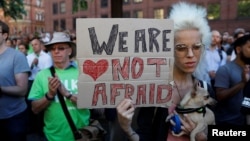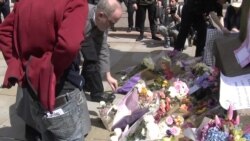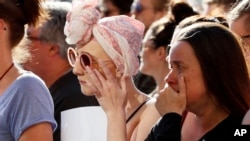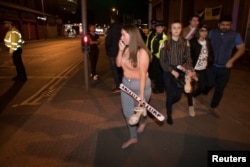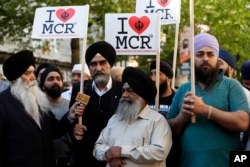Developments Tuesday concerning the suicide bombing attack at Manchester Arena include Britain raising its terror alert to the highest level, a top intelligence official saying, "Terror is not going away," the Islamic State claiming responsibility for the attack, Salman Abedi being identified as the suicide bomber, and arenas and stadiums making areas outside venues high priorities:
WATCH: VOA's Henry Ridgwell on the scene in Manchester
Britain Raises Terror Alert to Critical — the Highest Level -- Britain has raised its terrorism alert to critical -- the highest level -- and soldiers are being deployed to assist armed police, Prime Minister Theresa May announced Tuesday. May addressed the country one day after a suicide bomber blew himself up at an Ariana Grande concert in Manchester, killing 22 people and wounding nearly 60. She said members of the military will be deployed along with police at what she called "big events," including football (soccer) matches and concerts.
Top Intel: Manchester a Reminder That Terror Threat Is 'Not Going Away' -- Top U.S. intelligence officials have yet to confirm Islamic State's claim of responsibility for the deadly Manchester attack, but they warn the incident is a reminder that the threat of terrorism around the world is real and "is not going away."
IS Claims Responsibility for Blast Targeting Ariana Grande Concert -- The so-called Islamic State terrorist group has claimed responsibility for Monday's blast at a concert by U.S. pop star Ariana Grande in Manchester, England that killed at least 22 people and injured dozens more. The group said "a soldier of the caliphate" was responsible for the attack on people IS described as "crusaders." Many of those killed and injured in the blast were children and teenagers, police said.
Security Expert: Manchester Bomb Designed to Maximize Casualties -- The bomber who struck a concert by American pop star Ariana Grande in the northern English city of Manchester, killing 22 and injuring 59 Monday night, set out to kill and maim as many of the music fans — many of them teenagers and children — as possible, say British police.
Areas Outside Arenas Becoming a Bigger Security Priority -- The attack in Manchester illustrated the challenges in securing public spaces and potentially the limits of existing methods, although security protocols vary by country and venue.
Singer's Fans Recall How Manchester Arena Attack Happened -- But what was supposed to be a special night for Rihanna and thousands of other young concertgoers turned into a tragedy when a suicide bomb blasted off just outside the cavernous hall. It killed 22 people, including an 8-year-old girl, and injured 59 -- the deadliest attack in Britain in more than a decade.
Ariana Grande Returns to US Following Manchester Bombing -- Ariana Grande returned to the United States on Tuesday, one day after a suicide bomber killed 22 people at the singer's concert in Manchester, England, as questions lingered over whether she would continue her European tour.
Who Was Manchester Attacker Salman Abedi? -- The suspected suicide bomber who killed 22 people at a concert in Manchester, northern England, on Monday has been identified as 22-year-old Salman Abedi, British police said. Abedi was born in Manchester in 1994 to parents of Libyan birth, U.S. security officials said, citing British intelligence officials. Prime Minister Theresa May confirmed Abedi was born and brought up in Britain.
Trump: Manchester Bomber an ‘Evil Loser’ -- U.S. President Donald Trump responded to the bombing of an Ariana Grande concert in Manchester, England, Tuesday, calling the attackers and other terrorists “evil losers.” He added, "I won't call them monsters because they would like that term, they would think that is a great name. I will call them, from now on, losers because that's what they are: losers."




